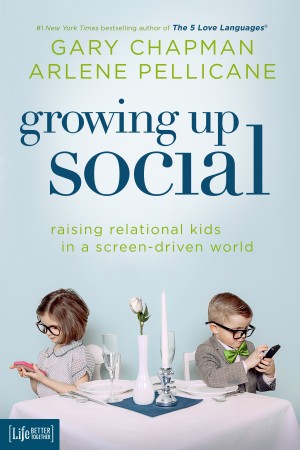How Do You Raise Relational Kids?
I connected with Arlene Pellicane shortly after I posted the Letter To My Boys about electronics usage. It didn’t take long to realize we shared the same heart for our children. The same heart many of us share for our children. A heart that desires to make the most of the moments, to live life intentionally, to invest wholeheartedly in their lives.
It’s interesting the same technology that can connect 2 strangers and begin a fast friendship can also be the tool that drives apart relationships, the ones that mean the most to us.
My review coming soon. But for now, I have the honor of sharing an interview with Arlene Pellicane who co-authored with Gary Chapman (5 Love Languages) her newest release Growing Up Social – Raising Relational Kids in a Screen Driven World.
Q: What motivated you to write Growing Up Social: Raising Relational Kids in a Screen-Driven World? Why is a resource like this so crucial for today’s families?
A:Very quickly, technology has become center stage in many American homes. Kids are connecting with screens more than they are with family members. This is a huge concern – whether you’re looking at a family staring at smart phones and tablets while dining at a restaurant or you’re trying to interact with a child who won’t look up from a video game.
Childhood is when a boy or girl’s heart is like wet cement – kids are open to our teaching, love, and guidance. We don’t want to miss this important window because we are too busy with our technology, or because we are entertaining our children, not training them.
The family has become much more digitally dependent since 2007 when the iPhone was introduced. My son was born before the iPhone and I remember going to the grocery store with him as a toddler. We pointed at fruit, looked for the Cheerios box, and I had to teach him how to behave in public. Today toddlers are too busy on their tablets or their mom’s smart phone in the grocery store to look around. With technology becoming more and more integrated in daily life, now more than ever, we have to decide how (and how much) we’re going to use it.
Q: While you offer some suggestions for modifying our children’s behavior with respect to electronic devices, it seems clear in reading your book that the adults in families will also have to commit to some changes. Why is it important that parents buy into the limitation of screens in their own lives?
A:When you boil it down, kids are going to imitate what their parents do – not necessarily what they say. In one study at the University of Washington, babies at just 42 minutes were already imitating adults. When the adult stuck his tongue out, the baby did the same. Babies grow to become children who watch where a parent focuses attention. If a parent is constantly checking emails, responding to texts and tweets, and digitally accessible most hours of the day, a child will mirror that by constantly using screens as well. As adults, we have to become comfortable with calls going to voicemail and texts not being answered at the speed of light. Most of the time, it’s wiser to play a board game with our kids then to get caught up with social media.
Q: You spend time in the book underscoring the importance of raising “relational” kids — could you please say a few words on what this means and why it is so critical in today’s world?
A:We present five A+ skills that a healthy child will possess: appreciation, affection, anger management, apology and attention. For example, if a child can appreciate what he or she has, that gratitude will take them far in life. Grateful people are less depressed, complain of fewer physical ailments, and do better in school. What kind of spouse, parent, employee or employer is your child becoming? Will he or she have the emotional skills to deal with both failure and success? Having real-life relational skills is more useful and important than having the high score on a game or the most friends on Facebook.
Q: Is there hope out there for the parent who feels that his or her family is already too far gone into the mess of electronic media?
A:Yes, there is always hope as long as your children live under your roof. Of course, it is easier to make adjustments when your children are younger. Instead of coming down hard on your child because she’s watching too much TV, you can actually begin with an apology. Talk to your child and say something like, “I owe you an apology. I’ve allowed you to do watch unlimited TV and that hasn’t been healthy for you. I’m sorry about that. I have been lazy about enforcing the rules or even communicating the rules clearly. We’re going to gradually make some changes so that you will become a healthier adult.” Those changes may include a decrease in screen time, an outside play time, a short walk around the block each night to talk, or family reading or game night.
Arlene Pellicane is a speaker and author of Growing Up Social: Raising Relational Kids in a Screen-Driven World (co-authored with Gary Chapman) and 31 Days to Becoming a Happy Wife. Arlene has been featured on the Today Show, Family Life Today, and The 700 Club.
She earned her BA from Biola University and her Masters in Journalism from Regent University. She lives in San Diego with her husband James and three children. Visit Arlene at www.ArlenePellicane.com for free family resources including a monthly Happy Home podcast.
[box] If you enjoyed today’s post, consider subscribing here to receive posts via email. You will receive a free Christmas ornament download that accompanies Seeking Christmas – Finding the True Meaning Through Family Traditions.[/box]
Some of the links in the post above are “affiliate links.” This means if you click on the link and purchase the item, I will receive an affiliate commission. Regardless, I only recommend products or services I use personally and believe will add value to my readers. I am disclosing this in accordance with the Federal Trade Commission’s 16 CFR, Part 255: “Guides Concerning the Use of Endorsements and Testimonials in Advertising.”




